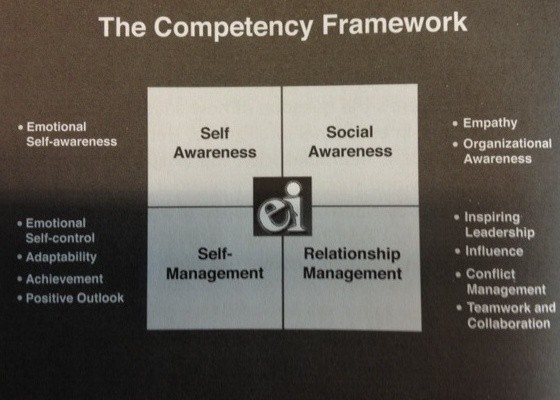Currently I am reading a very interesting book from Daniel Goleman on Leadership and the “Power of Emotional Intelligence”. Dr. Goleman specializes in psychology and brain sciences and thus applies the concepts of mindfulness to leadership, i.e. what it takes to become an outstanding leader. Most interestingly, he found out that it is not the IQ or technical skills that matter at the highest level, but rather the “Emotional Intelligence” (EI) abilities.
Dr. Goleman proposes a so-called “competency-framework” to describe how the fundamentals of EI translate into job success; two of these components are related to dealing with one self. Two others concern the ability to manage other people as well as relationships with others.

From D. Goleman: “Leadership – The power of Emotional Intelligence, Selected writings”. 2011 Northampton MA, page 14.
- Self-Awareness: Having a deep understanding of one’s emotions, strengths, weaknesses, needs and drives. People who are self-aware, are in fact honest with themselves and with others. They know what they can do and what they cannot as well as how their feelings and emotions affect themselves and others around them.
- Self-Management: This actually means that although we all have feelings, impulses and emotions, some of us have found ways to control these and channel them in useful ways, in order to bring out our inner core and creativity (as Personal Leadership would put it).
- Social Awareness: Nowadays, team leaders must be able to sense and understand the viewpoints of everyone around the (virtual) table. Cross-cultural dialogue and understanding is even more important now than before as our worlds become more and more globalized. Being able to put yourself into the shoes of somebody else to understand how he/she feels and at a larger scale, reading the organizational decision networks and currents are absolutely a must.
- Relationship Management: Competent people here work following the assumption that nothing important gets done alone. They are effective in managing relationships, putting relevant networks in place that they can draw upon even if only at a later stage. All other components play into this last one as “no leader is an island” according to Dr. Goleman.
What does this mean for us? Well, it shows again very nicely how being ‘mindful’ and in line with yourself, understanding your own feelings/emotions and being able to interpret them affects others in a positive and effective way. Leading yourself adequately and being aware of your own constraints, culture, worldviews and abilities plus being willing to learn and move forward on the path of “emotional intelligence” will certainly have a major impact on how you will lead others.
Thanks for reading and feel free to contact me for more info/advice, Jenny
Further reading:


